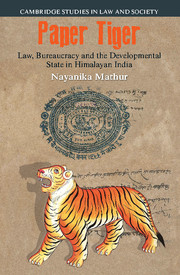Crossref Citations
This Book has been
cited by the following publications. This list is generated based on data provided by Crossref.
Mathur, Nayanika
2015.
“It’s a conspiracy theoryandclimate change”.
HAU: Journal of Ethnographic Theory,
Vol. 5,
Issue. 1,
p.
87.
2016.
A Sociology of Transnational Constitutions.
p.
521.
Bear, Laura
2016.
Time as Technique.
Annual Review of Anthropology,
Vol. 45,
Issue. 1,
p.
487.
2016.
Criminal Defense in China.
p.
201.
Chopra, Deepta
2016.
Demand Shortfalls or Supply-side Constraints.
Journal of South Asian Development,
Vol. 11,
Issue. 2,
p.
175.
Gandhi, Ajay
2017.
The sanctioning state.
Focaal,
Vol. 2017,
Issue. 77,
p.
8.
2017.
Duties to Care.
p.
259.
Gould, William
2017.
Paper, public works and politics: tracing archives of corruption in 1940s–1950s Uttar Pradesh, India.
Contemporary South Asia,
Vol. 25,
Issue. 1,
p.
38.
MATHUR, NAYANIKA
2017.
Eating Money: Corruption and its categorical ‘Other’ in the leaky Indian state.
Modern Asian Studies,
Vol. 51,
Issue. 6,
p.
1796.
Valverde, Mariana
2017.
From persons and their acts to webs of relationships: some theoretical resources for environmental justice.
Crime, Law and Social Change,
Vol. 68,
Issue. 5,
p.
547.
2017.
The Politics of Bureaucratic Corruption in Post-Transitional Eastern Europe.
p.
215.
2017.
Books received.
Journal of the Royal Anthropological Institute,
Vol. 23,
Issue. 4,
p.
858.
Berger, Tobias
2017.
Palaces of Hope.
p.
198.
Ellison, Susan Helen
2017.
‘You have to comply with paper’: debt, documents, and legal consciousness in Bolivia.
Journal of the Royal Anthropological Institute,
Vol. 23,
Issue. 3,
p.
523.
Logan, Sarah
2017.
The needle and the damage done: Of haystacks and anxious panopticons.
Big Data & Society,
Vol. 4,
Issue. 2,
p.
205395171773457.
2018.
Domesticating Democracy.
p.
134.
2018.
Domesticating Democracy.
p.
221.
2018.
Domesticating Democracy.
p.
121.
2018.
Domesticating Democracy.
p.
194.
2018.
Children as ‘Risk'.
p.
357.





